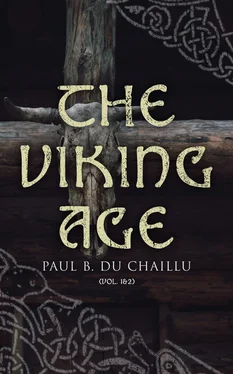Paul B. Du Chaillu - The Viking Age (Vol. 1&2)
Здесь есть возможность читать онлайн «Paul B. Du Chaillu - The Viking Age (Vol. 1&2)» — ознакомительный отрывок электронной книги совершенно бесплатно, а после прочтения отрывка купить полную версию. В некоторых случаях можно слушать аудио, скачать через торрент в формате fb2 и присутствует краткое содержание. Жанр: unrecognised, на английском языке. Описание произведения, (предисловие) а так же отзывы посетителей доступны на портале библиотеки ЛибКат.
- Название:The Viking Age (Vol. 1&2)
- Автор:
- Жанр:
- Год:неизвестен
- ISBN:нет данных
- Рейтинг книги:3 / 5. Голосов: 1
-
Избранное:Добавить в избранное
- Отзывы:
-
Ваша оценка:
- 60
- 1
- 2
- 3
- 4
- 5
The Viking Age (Vol. 1&2): краткое содержание, описание и аннотация
Предлагаем к чтению аннотацию, описание, краткое содержание или предисловие (зависит от того, что написал сам автор книги «The Viking Age (Vol. 1&2)»). Если вы не нашли необходимую информацию о книге — напишите в комментариях, мы постараемся отыскать её.
The Viking Age (Vol. 1&2) — читать онлайн ознакомительный отрывок
Ниже представлен текст книги, разбитый по страницам. Система сохранения места последней прочитанной страницы, позволяет с удобством читать онлайн бесплатно книгу «The Viking Age (Vol. 1&2)», без необходимости каждый раз заново искать на чём Вы остановились. Поставьте закладку, и сможете в любой момент перейти на страницу, на которой закончили чтение.
Интервал:
Закладка:
Besides the sacrifices already mentioned others were held when the aid of the gods was required; the most important of them were human sacrifices, which were offered in times of great calamity, such as famine, or in order to avoid some great evils, or to obtain victory, or for some other weighty reasons.
“At this time occurred a very bad year in Reidgotaland, and it looked as if the land would become a waste. Lots were then thrown by the wise men, and they threw the sacrificing-chip; the answer came that there never would be a good year in Reidgotaland until the highest-born boy in the land should be sacrificed. A Thing was summoned, and all agreed that Angantýr, son of Heidrek, was the foremost there, because of his kin, but nobody dared to mention it. Then they resolved to submit this question to the decision of King Höfund in Glœsisvöll (Heidrek’s father); the most high-born were to be chosen for the journey, but everybody declined. King Harald and many others asked King Heidrek to assist in deciding this question, and he consented. He at once had a ship made ready, on which he went with many renowned men, and sailed to Risaland. When King Höfund heard of his arrival he at once wanted to have him slain, but Queen Hervör remonstrated, and so managed that they were quite reconciled. Then Heidrek told his errand and asked for his decision, and Höfund said that his son was the foremost in the land. At this King Heidrek changed colour and thought the case became difficult; he asked his father to give him advice how to save the life of the boy. Höfund said: ‘When thou goest home to Reidgotaland, thou must summon the men to a Thing from thy possessions and those of King Harald, and there pronounce thy decision about thy son. Then thou shalt ask how they will reward thee if thou allowest him to be sacrificed. Say that thou art a foreigner, and that thou wilt lose thy land and people if this is to take place. Then thou shalt make it a condition that one-half of the men of King Harald present at the Thing shall become thy men or else thou wilt not give up thy son, and this shall be confirmed by oaths. If thou dost get this I need not give thee advice as to what thou shalt do thereafter.’ Heidrek thereupon took leave of his father and mother, and sailed away from Risaland. When Heidrek returned to Reidgotaland he summoned a Thing, to which he spoke thus: ‘It is the decision of my father, King Höfund, that my son is the foremost here in the land, and is to be chosen for sacrifice; but in return for this, I want to have power over one-half of those of King Harald’s men who have come to this Thing, and you must pledge me this.’ That was done, and they came into his host; then the bœndr asked that he should deliver his son to them, and thus improve their season. But after the hosts had been divided, Heidrek asked his men to take oaths of allegiance. This they did, and swore that they would follow him out of the land and in the land to wherever he wanted. Then he said: ‘I think that Odin gets the value of a boy if, instead of him, he gets King Harald and his son and his entire host.’ He bid them raise his standard to attack King Harald and slay him and all his men. The war horns were sounded and the attack made. The battle soon turned against King Harald and his men, for they had far fewer men and were unprepared. But when they saw there was no escape they fought with great valour, and cut down the men of King Heidrek so fiercely that it seemed uncertain which would be defeated. When Heidrek saw his men fall thus in heaps, he rushed forth with the sword Tyrfing and killed one after the other; at last King Harald and his son and a great part of their men fell there, and Heidrek became the slayer of his father and brother-in-law. This was reckoned to be the second nithings-deed committed with Tyrfing according to the spell of the Dvergar. King Heidrek reddened the temple-altars with the blood of King Harald and Halfdan, and gave Odin all the dead men who had fallen there, in the place of his son Angantýr, in order to improve the season. When Queen Helga heard of the death of her father she was so affected that she hanged herself in the disar-hall 257of the temple” (Hervarar Saga, c. 11 & 12).
Several instances are mentioned in which powerful kings were sacrificed or offered their children on the altars of the gods.
“There was a great crowd of men who left Sweden because of King Ivar’s rule. They heard that Olaf Tretelgja 258had good lands in Vermaland, and so many went thither that the country could not support them. There then came a very bad season and a great famine. They attributed this to their king, as the Swedes are wont to hold him accountable for both good and bad seasons. King Olaf was not a zealous sacrificer, and this the Swedes did not like, thinking that therefore arose the bad years. They then gathered a host, went against the king, surrounded his house, and burned him, giving him to Odin as a sacrifice for good years. This was at Vœnir (Venern)” (Ynglinga Saga, c. 47).
The custom of sacrificing a beloved child of a chief was considered, as it well might be, the highest atonement that could be offered, and is one of such antiquity that its birth is lost in the dim light of past ages. We have remarkable instances of this custom mentioned in the Bible; the story of Abraham and Isaac, and of Jephthah’s vow show the existence of the practice in very early times. In Lev. xx. 2–4, the practice is mentioned as taking place among the heathen; and we see that, as in the North, the father had absolute power over the life of his child, otherwise he could not sacrifice him.
The most thrilling accounts of sacrifice of children are those of the sacrifice by Hakon Jarl of his own son, and by King Aun of nine sons. 259
In the beginning of the battle of the Jomsvikings against Hakon Jarl and his sons luck was against him, and the Jarl called his sons ashore, where he and they met and took counsel.
“Hakon Jarl said: ‘I think I see that the battle begins to turn against us; and I dislike to fight against these men; for I believe that none are their equals, and I see that it will fare ill, unless we hit upon some plan; you must stay here with the host, for it is imprudent for all the chiefs to leave it, if the Jomsvikings attack, as we may at any moment expect. I will go ashore with some men and see what can be done.’ The Jarl went ashore north to the island. He entered a glade in the forest, sank down on both his knees and prayed; he looked northwards and spoke what he thought was most to the purpose; and in his prayers he called upon his fully trusted Thorgerd Hórdatróll; but she turned a deaf ear to his prayer, and he thought that she must have become angry with him. He offered to sacrifice several things, but she would not accept them, and it seemed to him the case was hopeless. At last he offered human sacrifices, but she would not accept them. The Jarl considered his case most hopeless if he could not please her; he began to increase the offer, and at last included all his men except himself and his sons Eirik and Svein. He had a son Erling, who was seven winters old, and a very promising youth. Thorgerd accepted his offer, and chose Erling, his son. When the Jarl found that his prayers and vows were heard, he thought matters were better, and thereupon gave the boy to Skopti Kark, his thrall, who put him to death in Hakon’s usual way as taught by him” 260(Fornmanna Sögur, xi. 134).
Human sacrifices were resorted to by kings in order to lengthen their own life.
“When King Aun was sixty he made a great sacrifice in order to secure long life; he sacrificed his son to Odin. King Aun got answer from Odin that he should live another sixty winters. Thereupon he was king for twenty-five winters at Uppsalir. Then Áli the Bold, son of King Fridleif (in Denmark), came with his host to Sweden against King Aun; they fought, and Áli always gained the victory. King Aun left his realm a second time and went to the western Gautland. Áli was king at Uppsalir for twenty-five winters, till Starkad the Old slew him. After his death Aun came back to Uppsalir and ruled the realm for twenty-five winters. He again made a great sacrifice for long life and offered up another son. Odin told him that he should live for ever if he gave him a son every tenth year, and would call a herad 261(district) in the land after the number of every son whom he thus sacrificed. During ten winters after he had sacrificed seven of his sons he was unable to walk, and was carried on a stool. He sacrificed his eighth son and lived ten winters more in bed. He sacrificed his ninth son and lived ten winters more, and drank from a horn like a young child. He had one son left and wanted to sacrifice him, and thereupon to give Uppsalir with the herads belonging to it to Odin, and call it Tíundaland. 262The Swedes stopped him; then he died and was mound-laid at Uppsalir” (Ynglinga, c. 29).
Читать дальшеИнтервал:
Закладка:
Похожие книги на «The Viking Age (Vol. 1&2)»
Представляем Вашему вниманию похожие книги на «The Viking Age (Vol. 1&2)» списком для выбора. Мы отобрали схожую по названию и смыслу литературу в надежде предоставить читателям больше вариантов отыскать новые, интересные, ещё непрочитанные произведения.
Обсуждение, отзывы о книге «The Viking Age (Vol. 1&2)» и просто собственные мнения читателей. Оставьте ваши комментарии, напишите, что Вы думаете о произведении, его смысле или главных героях. Укажите что конкретно понравилось, а что нет, и почему Вы так считаете.












